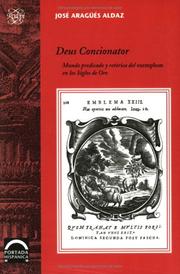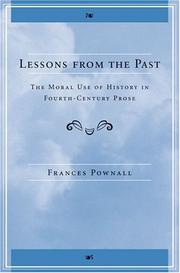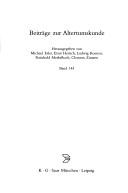| Listing 1 - 10 of 36 | << page >> |
Sort by
|
Book
ISBN: 9004499407 9004499423 9789004499409 9789004499423 Year: 2022 Publisher: Leiden ; Boston : Brill,
Abstract | Keywords | Export | Availability | Bookmark
 Loading...
Loading...Choose an application
- Reference Manager
- EndNote
- RefWorks (Direct export to RefWorks)
"Long regarded as a sycophantic producer of overblown moral platitudes, Valerius Maximus emerges from a series of studies as an independent thinker capable of challenging his readers through the material he has collected: he makes them think about real moral dilemmas and grants to non-Roman societies a remarkable equivalence to Rome. Through his silences as much as his sermons he decodes the value- and political-system of his day. Valerius is talented as a reader of others and himself was read appreciatively in the Later Empire and even more so by Christians in Medieval Europe. Contributors are John Atkinson, George Baroud, Emma Brobeck, Diederik Burgersdijk, Kyle Conrau-Lewis, Alain M. Gowing, Rebecca Langlands, Sarah Lawrence, Simon Lentzsch, Jeffrey Murray, Roman Roth, David Wardle"--
Exempla in literature --- Valerius Maximus --- Valerius Maximus. --- Criticism and interpretation --- Classical Studies --- Greek & Latin Literature
Book
ISBN: 1009224344 1009224379 1009224387 1009224336 Year: 2023 Publisher: Cambridge ; New York : Cambridge University Press,
Abstract | Keywords | Export | Availability | Bookmark
 Loading...
Loading...Choose an application
- Reference Manager
- EndNote
- RefWorks (Direct export to RefWorks)
This is the first monograph to provide a comprehensive interpretation of the Decameron's response to classical and medieval didactic traditions. Olivia Holmes unearths the rich variety of Boccaccio's sources, ranging across Aesopic fables, narrative collections of Islamicate origin, sermon-stories and saints' lives, and compilations of historical anecdotes. Examining the Decameron's sceptical and sexually permissive contents in relation to medieval notions of narrative exemplarity, the study also considers how they intersect with current critical assertions of fiction's power to develop empathy and emotional intelligence. Holmes argues that Boccaccio provides readers with the opportunity to exercise both what the ancients called 'Ethics,' and our contemporaries call 'Theory of Mind.' This account of a vast tradition of tale collections and its provocative analysis of their workings will appeal to scholars of Italian literature and medieval studies, as well as to readers interested in evolutionary understandings of storytelling.
Exempla in literature. --- Philosophy of mind in literature. --- Boccaccio, Giovanni, --- Ethics in literature.
Book
ISBN: 9781009224376 9781009224338 9781009224369 1009224387 1009224344 1009224379 Year: 2023 Publisher: Cambridge, United Kingdom ; New York, NY : Cambridge University Press,
Abstract | Keywords | Export | Availability | Bookmark
 Loading...
Loading...Choose an application
- Reference Manager
- EndNote
- RefWorks (Direct export to RefWorks)
This is the first monograph to provide a comprehensive interpretation of the Decameron's response to classical and medieval didactic traditions. Olivia Holmes unearths the rich variety of Boccaccio's sources, ranging across Aesopic fables, narrative collections of Islamicate origin, sermon-stories and saints' lives, and compilations of historical anecdotes. Examining the Decameron's sceptical and sexually permissive contents in relation to medieval notions of narrative exemplarity, the study also considers how they intersect with current critical assertions of fiction's power to develop empathy and emotional intelligence. Holmes argues that Boccaccio provides readers with the opportunity to exercise both what the ancients called 'Ethics,' and our contemporaries call 'Theory of Mind.' This account of a vast tradition of tale collections and its provocative analysis of their workings will appeal to scholars of Italian literature and medieval studies, as well as to readers interested in evolutionary understandings of storytelling.
Exempla in literature. --- Philosophy of mind in literature. --- Ethics in literature. --- Boccaccio, Giovanni,
Book
ISBN: 9570828285 Year: 2005 Publisher: 臺北 中央研究院, 聯經出版社
Abstract | Keywords | Export | Availability | Bookmark
 Loading...
Loading...Choose an application
- Reference Manager
- EndNote
- RefWorks (Direct export to RefWorks)
Chinese literature --- European literature --- Exempla in literature --- Rhetoric --- Christian influences --- History and criticism --- History
Book
ISBN: 9787108033833 Year: 2010 Publisher: 北京 生活, 读书, 新知三联书店
Abstract | Keywords | Export | Availability | Bookmark
 Loading...
Loading...Choose an application
- Reference Manager
- EndNote
- RefWorks (Direct export to RefWorks)
Chinese literature --- European literature --- Exempla in literature --- Rhetoric --- Christian influences --- History and criticism --- History

ISBN: 9004656251 9042004657 Year: 1999 Publisher: Amsterdam ; Atlanta, GA : Brill,
Abstract | Keywords | Export | Availability | Bookmark
 Loading...
Loading...Choose an application
- Reference Manager
- EndNote
- RefWorks (Direct export to RefWorks)
Dios persuade por medio de ejemplos. Si las Sagradas Escrituras y el mensaje de Cristo abundan en parábolas y símiles, el mundo y la historia constituyen un eterno sermón, una summa de paradigmas propuestos al hombre para su custodia y consideración. Sentido como modelo artístico para el orador evangélico, ese discurso divino de carácter ejemplar justificó el recurso de la prédica a las formas breves, y su estudio constante desde todos los ámbitos preceptivos. Al análisis de la reflexión teórica sobre el exemplum en la España de los Siglos de Oro pretende contribuir este Deus concionator. El libro aborda inicialmente el complejo problema de la terminología sobre el género y tiene escalas en cuantos aspectos ayudan a comprender las razones de su pervivencia en el sermón renacentista y barroco: desde la tópica ejemplar, que indaga la tenue frontera entre res y verba inherente al paradigma y explora su especial afinidad con los modos de persuasión retórica, a la más sistemática preceptiva sobre sus formas y funciones en el discurso áureo. Una preceptiva que testimonia el influjo de las tesis oratorias grecolatinas y no menos el de ese otro erasmismo filológico de tan fecunda huella en nuestras letras. El estudio concluye con un capítulo dedicado a los matices de la compilación de las formas breves en la época, eje de ese itinerario que nace de un Dios sentido como primer predicador y a Él conduce a partir de la observación y lectura de todo lo creado.
Didactic literature, Latin (Medieval and modern) --- Exempla in literature. --- Preaching --- Rhetoric --- History.
Multi
ISBN: 9781009224376 1009224387 1009224344 1009224379 9781009224338 9781009224369 Year: 2023 Publisher: Cambridge Cambridge University Press
Abstract | Keywords | Export | Availability | Bookmark
 Loading...
Loading...Choose an application
- Reference Manager
- EndNote
- RefWorks (Direct export to RefWorks)
This is the first monograph to provide a comprehensive interpretation of the Decameron's response to classical and medieval didactic traditions. Olivia Holmes unearths the rich variety of Boccaccio's sources, ranging across Aesopic fables, narrative collections of Islamicate origin, sermon-stories and saints' lives, and compilations of historical anecdotes. Examining the Decameron's sceptical and sexually permissive contents in relation to medieval notions of narrative exemplarity, the study also considers how they intersect with current critical assertions of fiction's power to develop empathy and emotional intelligence. Holmes argues that Boccaccio provides readers with the opportunity to exercise both what the ancients called 'Ethics,' and our contemporaries call 'Theory of Mind.' This account of a vast tradition of tale collections and its provocative analysis of their workings will appeal to scholars of Italian literature and medieval studies, as well as to readers interested in evolutionary understandings of storytelling.
Thematology --- Boccaccio, Giovanni --- Exempla in literature. --- Philosophy of mind in literature. --- Ethics in literature. --- Boccaccio, Giovanni,

ISBN: 0472113275 Year: 2004 Publisher: Ann Arbor University of Michigan press
Abstract | Keywords | Export | Availability | Bookmark
 Loading...
Loading...Choose an application
- Reference Manager
- EndNote
- RefWorks (Direct export to RefWorks)
Exempla in literature. --- Historiography --- Moral and ethical aspects --- History --- Exempla in literature --- Historical criticism --- Authorship --- Criticism --- Greece --- Historiography. --- Intellectual life --- To 1500 --- Exempla --- History and criticism --- To 146 B.C.
Book
ISBN: 8815020012 9788815020017 Year: 1989 Publisher: Bologna Mulino
Abstract | Keywords | Export | Availability | Bookmark
 Loading...
Loading...Choose an application
- Reference Manager
- EndNote
- RefWorks (Direct export to RefWorks)
Exempla in literature. --- Italian literature --- History and criticism. --- Exempla in literature --- -Italian literature --- -Ottovolante (Group of writers) --- History and criticism --- -History and criticism --- Italian literature - To 1400 - History and criticism. --- Italian literature - 15th century - History and criticism.

ISBN: 3598776934 3110961814 Year: 2001 Volume: Bd. 144 Publisher: München : K.G. Saur,
Abstract | Keywords | Export | Availability | Bookmark
 Loading...
Loading...Choose an application
- Reference Manager
- EndNote
- RefWorks (Direct export to RefWorks)
Die Abhandlung trägt einer neueren Tendenz in der Literaturwissenschaft Rechnung, Untersuchungen von Stil und dramatischem Aufbau mit den Ergebnissen historischer Forschung zu verknüpfen. Im Sinne des New Historicism wird deshalb auch danach gefragt, welche zeitgenössischen Diskurse in den Res Gestae verhandelt werden. Um sowohl das Zeittypische, als auch das Besondere der Res Gestae herauszuarbeiten, werden die Stile und Darstellungsabsichten des Tacitus und des Ammian deutlich voneinander abgegrenzt und ein Vergleich mit dem Zeitgenossen Aurelius Victor gezogen. Abschließend werden die Ergeb
Ammianus Marcellinus. --- Latin literature --- Exempla --- Littérature latine --- History and criticism --- Histoire et critique --- Exempla in literature. --- Ammien Marcellin
| Listing 1 - 10 of 36 | << page >> |
Sort by
|

 Search
Search Feedback
Feedback About UniCat
About UniCat  Help
Help News
News